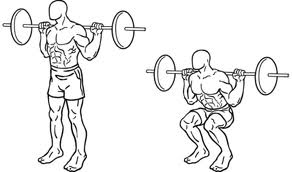Winter has arrived, bringing along colder air and holiday spirit. The majority of time will be spent bundled up in layers of clothes; no better time than to bulk and put on a little muscle. It always catches me by surprise when someone tells me that they plan to diet during the winter and bulk during the summer. No you have it all wrong! No one will be able to see your six pack when it is covered up (unless you live somewhere like Florida or the Bahamas) and I doubt you want to be carrying extra fat during beach season. Not to mention the mental agony that comes along with trying to keep calories low while your family is baking wonderful holiday goodies. It just does not make sense to me. It is winter right now and I am going to assume that most people reading this article feel the same way I do and are using this time to build size. So for all those who are, here are the key factors for a successful bulk.
Calories
Nutrition makes up 80% of the equation when it comes to muscle gain or loss, so I feel it important to tackle that first. Too often I hear people claim that they are eating everything in sight, but cannot seem to put on any weight. Most of these people are greatly underestimating their food intake and cannot tell me what they usually eat on a regular basis. You can work out until you are blue in the face, but if you are not consuming more calories than you are burning, you will not grow. At the same time, you do not want to eat so much food that you balloon up 45 pounds and look like you have a tire wrapped around your stomach. The goal of a bulk is to put on as much muscle as possible while minimizing fat gain. In order to do this, figure out your maintenance calories (the amount of calories you need to maintain your current weight) and add 250-500 calories to that. That is a moderate surplus that will allow enough energy for growth with minimal fat gain. Another way of doing it is to multiply your bodyweight by 18-20. This will usually provide a number of calories that produces a similar surplus. It is important to understand that metabolic rate changes daily and the numbers you come up with will need to be adjusted based on how much muscle or fat you are gaining. If you are not gaining strength in the gym and the scale has not moved in two weeks, add a couple hundred calories to your diet. If you notice that you are putting on weight too quickly and gaining too much fat, drop the calories by a couple hundred.
Protein is the building block of connective tissue and skeletal muscle, are enzymes that catalyze important chemical reactions in your body, and play a major role in your immune system. When calcium and protein are sufficient in the diet, it increases bone density and fights osteoperosis. Proteins also work with carbs to increase muscle protein synthesis. For those who fear the consumption of protein because of supposed harm to the kidneys, protein has not been shown to cause any harm unless there is a predisposed kidney problem. Protein intake does not need to be as high on a bulk as on a diet because the higher amount of carbohydrates during a bulk will spare protein from being used as energy. 1-1.5 grams per pound of target bodyweight is generally the ideal range. This equates to a 160 pound male eating 160-200 grams of protein a day. Protein intake should be spread out throughout the day for optimal muscle protein synthesis, and come from a variety of sources ranging from chicken and fish, to whey protein, eggs, and lean red meat.
Fats are the primary energy source of the body during low intensity activities (walking, light cardio, sitting on the couch), provide insulation to internal structures in the body, allow for the absorption of fat soluble vitamins, and account for optimal hormone functions. This does not even come close to all of the benefits of fat on health and performance, but just remember that they are extremely important and not to be feared. The majority of fat intake should come from polyunsaturated and monounsaturated fats with a small amount coming from saturated fats. Some sources of monounsaturated and polyunsaturated fats are nuts, nut butters, avocados, oils such as olive and canola oil, fatty fish, and fish oils. Saturated fats are found in meat, dairy products, egg yolk, most processed goods, etc. Trans fats (hydrogenated vegetable oil or partially hydrogenated vegetable oil) should be avoided as much as possible as they add more harm than benefits to the body. The ideal amount of fat is 20-30% of total caloric intake. A simple way of calculating this is to take your target bodyweight and multiply it by .4-.6 to get the number of grams of fats per day.
Once protein and fat intake are calculated, fill in the rest of your calories with carbohydrates. Carbs have the greatest effect on the secretion of insulin, the storage hormone, which drives nutrients and protein in to damaged muscle cells. They are loaded with vitamins and minerals (if they are nutrient dense unprocessed carbs), provide fuel to the brain, and are the only source of energy that can sustain high intensity activities such as weight training. Typically, carbohydrate intake will come out to 2-3 times your target bodyweight. This equates to a 150 pound male eating 300-450 grams of carbs a day during a bulk. It will not be the same for everyone, but that is a general starting point for carb intake during your bulk. Build the foundation on nutrient dense and unprocessed carbs. Good sources of carbs are sweet potatoes, russet potatoes, old fashioned or steel cut oatmeal, whole wheat pasta, whole wheat bread, and white rice. However, you are bulking with a high caloric intake. After you have met your needed intake of vitamins and minerals, do not be afraid to fit in other foods that you enjoy. Get in at least 25-35 grams of fiber a day, two or three pieces of fruit, and eat a good amount of dark green veggies every day.
In order for the muscles to grow, they must be subject to progressive overload. This can be accomplished through changes in intensity, volume, tempo, rest time, etc. An example of overload is using the same weight for more repetitions, or the same amount of repetitions with more weight. High reps/sets and low to moderate intensity (weight) will cause muscular hypertrophy (increase in size). High intensity and low to moderate reps/sets will lead to increases in muscular strength. Training for both strength and size will go a long way in helping you achieve the physique you are working for. Train in the 12-15, 8-12, 6-8, and 3-5 rep ranges to take advantage of both training adaptions, and use compound exercises such as squats, deadlifts, and bench press that work a large group of muscles the majority of the time. It would also benefit you to keep a training log. Writing your weights down will ensure that you make progress every week.
Do not overdo it on the cardio. The primary goal is muscle gain, and I would only recommend 2-3 sessions per week at a moderate intensity. High volume weight training elicits a cardiovascular response anyway, and any extra cardio will just create a greater amount of energy expenditure during the day. A small amount of extra cardio is fine, but too much will impede recovery and growth. However, if you must do a lot of cardio, simply make sure that you ramp up the calories to compensate for the extra energy expenditure.
Muscles are made when you are asleep, not in the gym. Weight training breaks down muscle tissue and they grow back stronger and bigger. This only happens if you give them adequate rest. I would recommend at least two days off from the gym every week, and it is important to get 6-8 hours of sleep per night.
Take Away Points:
– You must eat more than you are burning to gain weight
–*Eat a moderate surplus of 250-500 calories per day*
– *1-1.5 times your bodyweight in protein*
-Eat a variety of protein sources and spread them throughout the day
-*.4-.6 times your bodyweight in fat, or 20-30% of total caloric intake*
– Some saturated fat is beneficial, but trans-fat should be avoided
-*After protein and fat intake is calculated, fill in the rest of the calories from carbohydrates*
– About 2-3 times your bodyweight in carbohydrates
– *Eat mostly nutrient dense unprocessed carbohydrates*
-*6-8 hours of sleep per night*
-* Drink at least a gallon of water per day*
– Do not overdo cardio
-*Train with compound movements like squats, deadlifts, and bench press*
-*Train in a variety of rep ranges from 12-15, 8-12, 6-8, and 3-5*
–Keep a training journal
Like What You See?
Get the Smoot Fitness Guide to Getting Stronger - FREE.








Leave a Reply